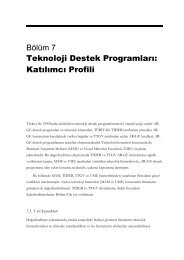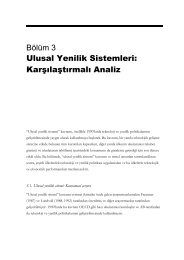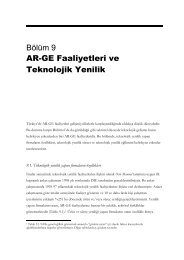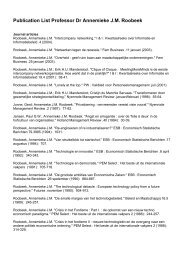Libro Blanco Vol I en Ingles
Libro Blanco Vol I en Ingles
Libro Blanco Vol I en Ingles
Create successful ePaper yourself
Turn your PDF publications into a flip-book with our unique Google optimized e-Paper software.
also mean an uncomfortable position for Ministers in some circumstances, especially in those where the Councilhas to evaluate the behaviour of the Governm<strong>en</strong>t with respect to its commitm<strong>en</strong>ts in the area of innovation.To tackle this problem, the Council initially analyzed leaving the option op<strong>en</strong> for Secretaries of State toabstain from voting in situations that would be conflictive. However, as the discussions progressed, the view washeld that the Ministers be members of the Council, with the right to express opinions but not to vote, ev<strong>en</strong>though some advisors insisted that the full participation of Ministers <strong>en</strong>sures a deeper commitm<strong>en</strong>t from thegovernm<strong>en</strong>t with the work of the Council.It is important to highlight, in any case, that to guarantee that this formula of an “advisor-evaluatorCouncil” operates as proposed, it needs a legal backing to sanction the appointm<strong>en</strong>t of advisors, define the timethey remain in their posts, the reasons for dismissal and a system for the gradual appointm<strong>en</strong>t of new members;and that, ev<strong>en</strong>tually, guarantees t<strong>en</strong>ure during that period. 77 To this, one can add a minimum budget thatallows the Council to operate fully autonomously in the production of the information required to define andrevise the National Innovation Strategy and to evaluate its implem<strong>en</strong>tation. [see Figure 2]CHECKS AND BALANCESThe fact that this Council gathers the viewpoints of various players of the National Innovation Systemfacilitates coordination that would not naturally exist, helps to better understand the problems and contributesto the search for cons<strong>en</strong>suses and achieving an adequate balance of individual and collective, public and privateinterests.This also allows tackling the risk that the Council itself be a target for capture. One option for getting ridof this threat would be the formation of a group of “good wom<strong>en</strong> and m<strong>en</strong>” without vested interests in the issueof innovation; but this would surely sacrifice the specific knowledge that is ess<strong>en</strong>tial wh<strong>en</strong> analyzing what reallyhapp<strong>en</strong>s in the system. As such, the objective of minimizing the risks of capture could, in this case, lead toserious problems of information that would be detrim<strong>en</strong>tal to an optimal performance of the Council.The solution proposed th<strong>en</strong> is to get the most out of the specific knowledge of possible members of theCouncil and to deal with the danger of capture putting all private interests together on the same table, in orderto create checks and balances. To this, at least two public policy experts would be added, who would be moreg<strong>en</strong>eralist in the area of innovation, but who can contribute with a global vision that the other members maynot have.[see Figure 3]77 The Council did not reach a cons<strong>en</strong>sus on this point.104TOWARDS A NATIONAL INNOVATION STRATEGY FOR COMPETITIVENESSBOX 3VOLUME 1HOW TO REGULATE POSSIBLE CONFLICTS OF INTERESTThe need for specific knowledge that can only beprovided by the participants of the National Innovation Systemop<strong>en</strong>s up the door to the possibility that within the Councilpossible conflicts of interest can arise. A radical solution to thisdanger would be to form the Council only with people whohave no interest in the issue, but this makes no s<strong>en</strong>se byproviding a body whose value as a specialized advisor couldbe virtually zero. Thus, we consider that the best option is toget the most out of the knowledge and information of itsmembers, being very clear, in any case, that the real danger ofconflicts of interest occurring declines to the ext<strong>en</strong>t that there isa clear separation of roles betwe<strong>en</strong> the role of suggestingpublic policies for innovation of the Council, and theimplem<strong>en</strong>tation role corresponding to the governm<strong>en</strong>t, once itmakes the proposals its own.This distinction is fundam<strong>en</strong>tal for understanding thereal scope of the recomm<strong>en</strong>dations that the Council mustmake on the use of the public funds for innovation every year,especially those of the Innovation Fund for Competitiv<strong>en</strong>ess(IFC). The cons<strong>en</strong>sus reached by the Council is that its taskshould be limited to recomm<strong>en</strong>ding g<strong>en</strong>eral lines of action thatsupport the fulfilm<strong>en</strong>t of the Strategy without getting involved,under any circumstances, in operational aspects of theallocation of resources. This fully matches the propositionalwork of the Council in the area of public policies, that seeks to<strong>en</strong>sure a positive impact of the participation of the State ininnovation.The fact that the Council is comprised of people fromvarious spheres of the National Innovation System –governm<strong>en</strong>t, business, sci<strong>en</strong>tists and academics– also helps toreduce possible conflicts of interest, which means that thelegitimate individual points of view of each member are alwaysbalanced by that of another member or various othermembers.The members of the Council are also required toadhere to all the established existing norms on administrativeprobity.



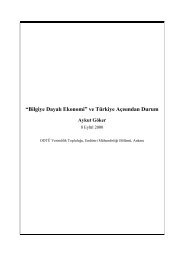
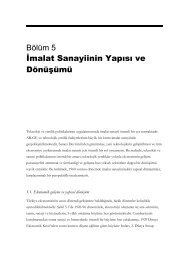
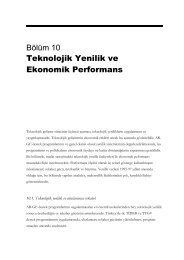

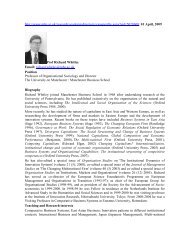

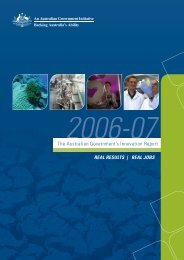
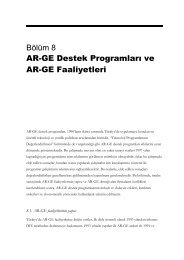

![[Tam] Uygula[ya] - Bilim, Teknoloji ve Ä°novasyon Politikaları TartıÅma ...](https://img.yumpu.com/36820041/1/184x260/tam-uygulaya-bilim-teknoloji-ve-anovasyon-politikalara-tartaama-.jpg?quality=85)
